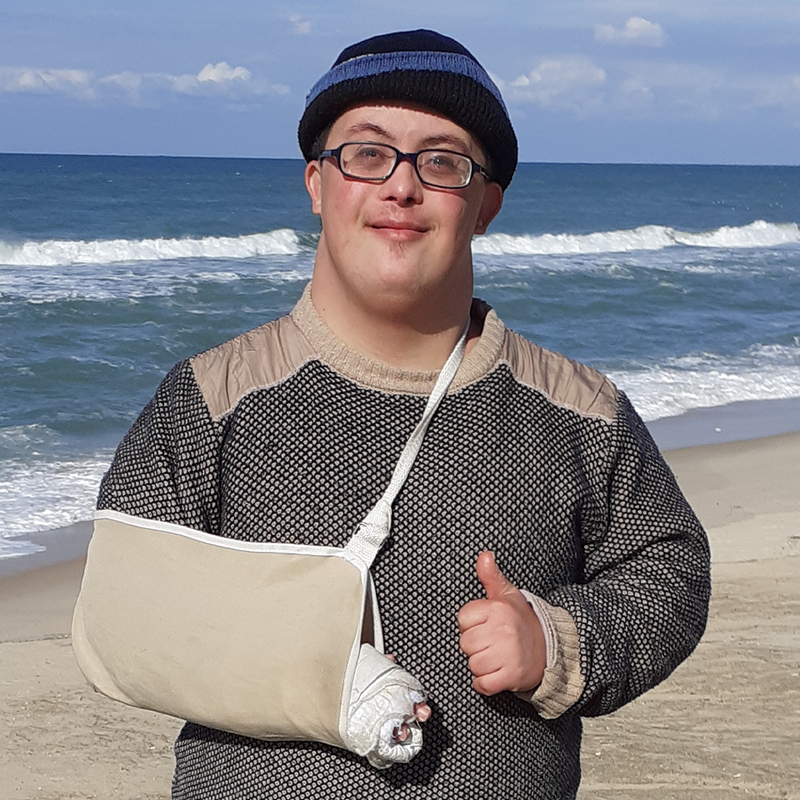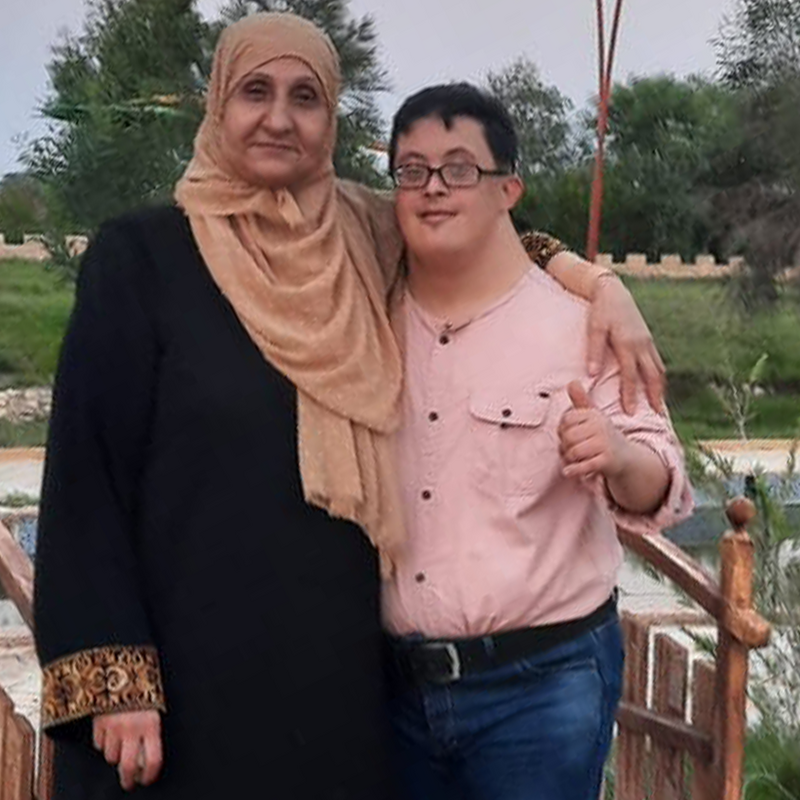The Electronic Intifada 4 February 2025
This past July, when I learned that my neighbor Ahmad Saeed al-Abadlah was missing, I joined in the search to find him.

Ahmad al-Abadlah was killed by the Israeli military in July 2024.
Ahmad and his family lived in a tent about 50 meters away from my own family’s tent in the Mawasi al-Qarara area of Khan Younis, and concerned neighbors – all of us living in this camp for displaced people – embarked on a search for him.
Ahmad was 30 years old and had Down Syndrome. His smile seemed to never leave his face, and despite our daily suffering in the camp, his presence imbued the place with hope and a love of life.
According to Ahmad’s mother Suhaila, on 25 July 2024 Ahmad left the tent in the morning, like usual. She said that even though he had Down Syndrome, “the family did not keep him confined to the tent” and “he had a strong ability to communicate with those around him, including cousins, neighbors and relatives.”
Most days, he would walk around the camp and socialize. He also loved dabke – a traditional folk dance – and swimming in the sea, which was not too far from his tent. His days were active and independent, but he would always return to his family every evening.
Yet when evening came and Ahmad had not returned to the tent, his family began to worry. It was not like Ahmad to be so late. Suhaila told Firas, Ahmad’s older brother, that something was wrong, and the family searched for Ahmad throughout the camp and called hospitals and the police.
They searched for four days and could not find him.
Then, on 29 July, the family was shocked to learn that news of Ahmad’s death was published in a local news chat maintained by camp residents.
They set out to recover Ahmad’s body and to learn what had happened to their beloved son and brother.
Upheavals and loss since October 2023
“Since Ahmad was born, he was a smart, calm, sociable child who loved life,” said Suhaila.
Ahmad was one of seven siblings. Their father had passed early in Ahmad’s life.
Suhaila said that the family paid Ahmad extra attention and that he was enrolled in special education that allowed him to thrive and learn at his own pace.
For the al-Abadlah family, as for most Palestinians in Gaza, October 2023 was the beginning of 15 months of forced upheavals and loss as a result of Israel’s war of extermination. Ahmad, his mother and his brother Firas, as well as Firas’ wife and children, were first displaced on 9 October 2023.
At the end of November 2023, during the seven-day “pause” in fighting, the family tried to return to their home only to be forced to leave again once this temporary truce ended.
This time they sought shelter in western Khan Younis at the headquarters of an aid agency.
Israeli raids on the area intensified, however, and the family was then pushed to set up a tent in the Mawasi al-Qarara area near the beach.
“Ahmad was afraid of the sound of missiles, planes and bombs,” said Suhaila. “He put his hands above his head and laid on the ground when he heard the sound of explosions.”
A devastating discovery
After four days of looking for Ahmad, the family received a phone call from a neighbor – that is, a neighbor from their old neighborhood in Khan Younis, which they had been forced to leave back in October 2023.
He said that he had seen Ahmad’s body in front of the family’s home. The home is not far from their tent, about 3 kilometers, and Ahmad could have walked there. The neighbor further said that he could not get closer to Ahmad’s body because the area was being subjected to Israeli shelling.
Suhaila explained to The Electronic Intifada that she would often speak to friends and family about their home, and that it is possible Ahmad heard those conversations.
“While the occupation tanks were in our area, we did not know anything about the condition of the house, whether it had been demolished or bombed,” she said. “I was always hoping to check on our house. I spoke these words while Ahmad was listening to our conversations, but he did not comment or say anything.”
Another of Ahmad’s brothers, Alaa, immediately went to their home, despite the danger. He could not bear the thought of his brother exposed like that.
He found Ahmad’s torso in front of their house. It appeared that the force of whatever Israeli weapon killed Ahmad had also ripped his body in two. The summer heat had hastened the decomposition of what was left of Ahmad.
With the help of a neighbor, Alaa transported his brother on an animal-drawn cart to Al-Aqsa Martyrs Hospital and then buried him the same night in a cemetery near Mawasi al-Qarara.
The next day, a neighbor informed the family that they had found Ahmad’s leg about 200 meters from where his torso was found.
“We identified it from the clothes he was wearing on the day he went missing,” Suhaila said. “We brought his leg and buried it too.”
“Ahmad did not pose any threat”

Ahmad and his mother Suhaila.
Ahmad’s family is still trying to understand what happened that day.
Suhaila was in tears as she described how she believes that Ahmad was killed the first day he went missing, how she did not get to see her son’s body after he died and bid him a proper farewell, as her sons “preferred that the image of Ahmad remain in my mind and memory as it is, and he is laughing and smiling.”
Based on what she has learned from neighbors and her son Alaa, she believes that Ahmad was potentially targeted by an occupation drone when he approached his house.
“My son [Alaa] told me that when he moved Ahmad’s body, he found a hole [beneath the body] with a diameter of about 7 centimeters,” she said. “He also found the same hole in Ahmad’s chest, which makes it likely that the blow came from above, not from a tank artillery shell.”
Yet there are no known witnesses to Ahmad’s killing, and the only certainty is that the family’s neighborhood was under attack by Israeli forces that day.
Still, Suhaila cannot help but wonder why Ahmad was killed by Israeli forces that day.
“Ahmad did not pose any threat to [the occupation forces],” she said. “He was a defenseless civilian, a young man who loved life.”
It has been seven months since Ahmad’s death, and Suhaila still mourns her son and the brutality of his killing. She sits in front of the family’s tent in the evening and looks at the horizon, as if waiting for her son’s return or possibly for a justice that may never come.
Shaimaa Eid is a journalist based in Gaza.




